Hello. Post-script editing Ape, here.
Much like my retrospective on Homestuck, this is intended to be the start of a series on the Beach Boys that will not be immediately continued. Unfortunately, I do not have a surplus of time to do nothing but hard research, and the breadth and depth of the topic at hand demands a lot of it. This is another one of those series where I had to order books and, y’know, actually read them. However, also like I felt it apropos to begin my Homestuck retrospective on the anniversary of the series inaugural upload before the entire project was complete, I feel compelled to post the opening chapter before this series is finished as less than hour ago as of this writing, the family of Brian Wilson announced his passing.
I’m not sure it will get more timely than that. While Wilson himself is not the main focus of this opening, which was always intended to be a preamble to set the stage, hopefully those unaware of his immense but often unfairly unknown impact on popular music will come away with a better understanding of why I and many others hold his work in such high regard.
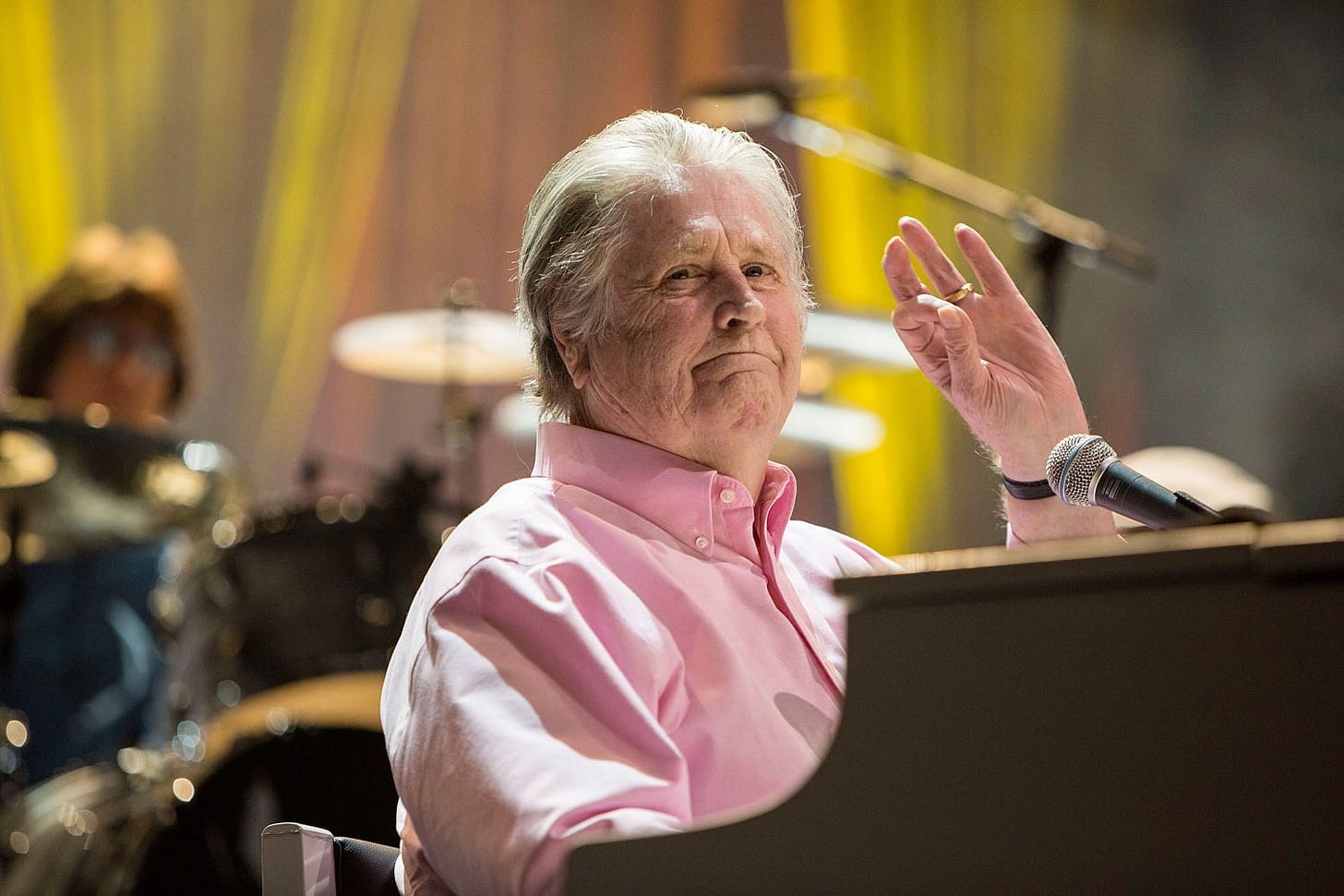
Surf’s up to a real one.
I listened to a lot of The Beatles growing up. At the time, I thought it was just about all I listened to when my dad was in the driver’s seat, strictly because I was too young and too musically illiterate to understand that any song I heard that sounded bright, jangly, and not performed by Raffi wasn’t recorded by The Beatles.
You see, when my mom drove us to and from school, youth sporting events, the store, or a run for the Golden Arches for some dank nugs1, she was always kind enough to let us children have a say in what music we listened to on the way. When daddy was driving, though… oh - the family car was not a democracy. It was an strict authoritarian dictatorship, and it operated under one cardinal rule: the driver picks the music.
At the time, I felt as if this was deeply unfair, and I sat in the backseat scribbling out letters to then-Chinese President, Hu Jintao, that I was a six year old American boy trapped in my father’s car being forced to listen to Creed and please please please send your glorious Chengdu J-20’s to liberate my ears from Scott Stapp’s growling. After many, many years of road-tripping with friends across the broad Lone Star state, I now realize that if my father was a dictator, he was a benevolent one, or at the very least, justified in his actions. After all, there is nothing that will extend four hours on the highway into a grueling test of endurance than when that one mother fucker in the backseat commandeers the speakers and starts playing Paramore when no one present is a seventeen year old girl with wanting musical taste. I have no real grievance with Paramore, nor anyone outside of their target demographic who enjoys them, but I’ll always hold that it’s slightly embarrassing for a grown ass man to insist in the very same cadence of a L.A.-area mall rat, that Paramore is like, seriously the best band, like, ever. Just give it one more song.

That experience made me revise my father’s despotic reign over the car; if you’re doing everyone else the service of being their chauffeur, yes, you do get the right to dictate what does and doesn’t come out of the speakers. Sure, I can’t say that his penchant for hair metal and butt rock2 always matched my tastes - I remember being subjected to a lot of Creed and a lot of Nickelback - but had I not been forced to listen to Green Day’s American Idiot every time I got in the car with him circa 2004, I’m pretty sure I’d still be listening to whatever puerile nonsense is being pumped out by Disney for middle school girls.
Truthfully, American Idiot is the first album, if not the first music intended for an audience above the age of ten, that I ever appreciated. Yes, that appreciation was basically foisted upon me by sheer brute force and repetition, and Green Day took a tragic turn for the deeply cringe well before they ever caught a fierce case of Shit Idiot Brain Fungus over Trump, but… Jesus of Suburbia still holds up pretty well.
Right? Right?
Anyways, my father was a product of the early 60’s. By the time he was in high school, The Beatles were nearly a decade in the past, having acrimoniously disbanded in 1970. Even though we recall the 70’s as the era of bell-bottoms, roller-rinks, and disco balls, one need only look at pictures of average people at the time to understand that the popular image of that time was heavily distorted. As my father always says, what popular culture remembers of the 60’s was more emblematic of the 50’s, and what we associate withe the 70’s was more aligned with the 60’s - the cultural divide is usually blurry and indistinct, and the hallmarks that now define those decades often only materialized half-way through. For instance, reports of the death of disco post-Disco Demolition Night in 1979 can be safely classified as exaggerated when Earth, Wind, and Fire, Diana Ross, and The BeeGees were still charting into the early half of the 80’s. The standard bearer of disco music didn’t even come out until the 70’s were over.
But my dad, as so many of his generation do, still had and has a deep and abiding love for The Beatles. Though his favorite band is AC/DC, which he really only came to love during his post-college years after their seminal 1980 game-changer Back in Black3, and his favorite band in high school was Rush - he often says he’d put Permanent Waves on his record player and let Geddy Lee sing him to sleep4 - he was still in the right age demographic to be caught in the gravitational pull of The Beatles mythos even after their collapse.
And that’s understandable.
The Beatles were a solid band. I know that in today’s era of revisionist music history, where everything that was popular pre-2012 is considered cringe cheugy boomer shit even by the music aficionados who once held them in high regard, The Beatles have never faced more allegations of being an overrated band that only got big by fortuitous happenstance - being at the right place at the right time, tapping into the right cultural trends, making connections with the right people, so on and so forth. I won’t say that it’s entirely untrue. The Beatles, from their very roots as jobbers in the Liverpool skiffle scene that aped the sounds of American rock, country, and blues music from the 40’s, took their cues from other bands that were pushing the boundaries of popular taste in England and abroad.
But what they did best was adapt that sound in a way that was palatable to a mainstream audience and, in turn, push the boundaries of popular music themselves in directions they may or may not have gone otherwise. They may have not started the psychedelic rock revolution, but albums like Revolver and Rubber Soul did a lot to raise its profile with the masses. This ability to transmute more niche styles and genres into something more accessible for a wider audience is a talent in and of itself.
And anyone who ever makes the claim that the Fab Four were talentless hacks is being blatantly and groundlessly disingenuous. Again, I’d never say they were among the best individuals at their respective instruments, but they were far from untalented. Ringo Starr is, these days, widely considered to be the one with the biggest skill issue of the mop-topped crew. Now, I’ll admit up front - I’m a Ringo apologist. Octopus’s Garden is my favorite Beatles’ track. Yes, yes, I know; it’s an objectively silly song. But fuck me if every single part of that song - the guitar, the bass, and especially Ringo’s drumming - isn’t actually hypnotically good when you actually study them them. And, also, watch this video of professional drummers trying - and failing - to replicate Ringo’s distinctive style of skiffle-influenced, 3/4 drumming, which typified some of the group’s most well known tracks.
Next time you say Ringo’s name, you put some respect on it, okay?
This is all to say that I don’t think my dad’s penchant for the band was unfounded. The Beatles are really not as bad as many like to pretend they are for cred in the music scene, these days. Besides - when the thinking men of the music scene are still writing apologia for Carly Rae Jepsen’s Emotion like it’s Holy Scripture over a decade after it’s release5, their opinion should be taken with a picogram of salt to begin with.
Let’s fast forward from my youth to my middle school years. At this time, I was gifted an iPod Nano by my parents to help alleviate the bus ride to school - which I hadn’t needed to take up until that point - from fucking intolerable to engendering slightly less suicidal ideations6. It was red, because red is a cool color.
I quickly leapt onto LimeWire and promptly infected my family’s computer with God only knows how much malware so I wouldn’t have to pay a whole buck ninety-nine for every song I wanted on iTunes, because back then, you couldn’t just pay Spotify a small fee to access damn near every song ever recorded and you could just do that shit. As Dickens said, it was the best of times, it was the worst of times.
I remember the first song I ever downloaded in a manner that may or may not have been legally questionable was Herb Alpert and the Tijuana Brass’s Spanish Flea.
Couldn’t tell you why, but I distinctly remember doing it. That track still goes hard, I’m afraid.
I remember that my favorite song at the time was Feel Good Inc. by The Gorillaz.
This may sound strange in hindsight given the current nostalgic reevaluation of that period, but around 2005 and 2006, I’m still convinced that The Gorillaz single-handedly saved popular music. Their album, Demon Days, has aged incredibly well. We all owe a debt of gratitude to the unibrow’d mongoloids that are the Gallagher brothers of Oasis for overpowering Damon Albarn’s band, Blur, in the great BritPop feud of the late 90’s and force him to make good music under The Gorillaz name instead.
I also remember my dad unwittingly introducing me to Oasis when he was listening to it on my granddad’s computer on a weekend visit to Houston this one time. He left the study to do… something, and just left Don’t Look Back In Anger blasting on the speakers so loud I could hear it from the living room. And thank God he did; I still think the guitar solo in that track is unparalleled.
At the risk of sounding like the old-timer I am at heart, they really don’t make rock bands like Oasis anymore. They truly were the last true rock band, embodying all the crucial elements necessary for greatness in the genre; unconscionable amounts of sex, drugs, and unchecked egotism that eventually causes the band to fall apart because everyone involved fucking hates each other.
I also acutely recall being inadvertently introduced by my father to another band that, at the time, I was actually well aware of. At least, I thought I knew who they were.
My father had - and still does have - a trunk so large that you could lay down inside of it and still have room to stretch full of CDs from back when those were the dominant medium for listening to music. My mom bought my dad one of the original iPods back in 2001 - it was one of the super cool black ones, too - for Christmas. It was supposedly from the entire family but, on account of being, like, eight and not having an income that didn’t come from my either of my parents as a reward for cleaning my room or good grades, she fit the bill for that one.
My dad wasted no time jumping on the computer and transferring every single CD in his possession into the MP3 format to juice up his shiny new iPod. It was a process that I think took months, which he’d spend playing Solitaire and WWII-theme RTS games while the CD’s copied. By the end of it, his iTunes library was immense. And, when I got my iPod several years later, I gained access to it, since back in those days, you didn’t rent the right to stream music from gate-keeping organizations; you owned it and could share it with whoever the fuck you pleased.
Novel concept, that.
I remember at the time my poor father tried to expand my musical tastes in an act of both paternal affection and cultural charity, but I wasn’t interested. Like, I remember him saying, Oh, hey, this is a good band, you’ll like this, and me just rolling my eyes and saying, Yeah, sure. Okay.
I don’t know if it was adolescent obstinate or plain stupidity that I grew out of, but I’m still not sure how I ever heard the legendary guitar lick from Buddy Holly and didn’t immediately lose my shit7.
That night, after he’d given up on the thankless task of attempting to culture me, I scrolled through the library and tried to find songs I might like on my own.
There’s only one real stand-out that comes to mind from that night.
As I idly and absently flicked from one song to the next without really giving many of them a fair shake, I saw the name of a familiar band. It’s one pretty much everyone, even dumb kids with no real concept of music, knew due to their ubiquity when it came to fun, feel good songs that usually played during summer pool parties.
At the time, I had no idea they’d made more than a handful of well-known songs. The fact they had other songs at all was surprising to me, so, naturally, I was curious; every song I’d ever heard by them was a certified banger that had played at summer-themed school functions and Texas Ranger baseball games, so it stood to reason they might have some delightful deep cuts, right?
I tested one or two songs. Didn’t do much for me. But then… oh, but then I clicked that song. When I started up that track, I could have never guessed that my entire concept of music was about to dramatically and permanently altered by a song that, to this day, I will say is one of the rare perfect pieces of music.
It’s not an experience that I can accurately describe. Words fail me.
It was something like this when it began.
It was something like this when the harmonies really kick in.
When the song finished, I was sitting there in a daze, unable to comprehend what had just graced my ears. I immediately started it again. I think I must have listened to it at least fifty times before I moved on, more than once going back just to listen to the opening again, which to this day I’m convinced is the greatest minute or so of rock music ever recorded. Everything about it is immaculate. The rich, layered harmonies, the sharp timing, the eclectic instrumentation, the exuberant sound juxtaposed against lyrics of bittersweet yearning; everything about it is so fine-tuned and precisely calculated that I wasn’t surprised to learn, many years later, that recording the vocals alone was a grueling, day-long affair that Al Jardin recalled as being painful beyond belief for all of us.
And that song would be Wouldn’t It Be Nice by The Beach Boys.
Music critic Nick Kent made the stellar commentary on The Beach Boy’s legendary ability to harmonize, stating, that the harmonies were so complex they seemed to have more in common with a Catholic Mass than any cocktail lounge acappella doo-wop. In an interview in 1990, Paul McCartney made the following comment on the track:
"‘Wouldn't It Be Nice'. That's the bit of melody I love. I’ll tell you what I was telling my kids, is that on most of the tracks on Pet Sounds, and it applies on this one, is that the orchestration, the instrumentation that's used on it, I was very fascinated by. Yeah, I love that one."
I can’t find any solid evidence that he ever said it, but it seems like a lot of people make the claim that McCartney said that it was one of his favorite songs, full stop (though other sources say God Only Knows takes that accolade). He did say, however, that the album the track is from - Pet Sounds - was a direct influence on perhaps the most iconic entry into The Beatles’s discography, Sgt. Pepper’s Lonely Hearts Club Band.
But we’ll come back to that later.
The smoldering impact crater of Wouldn’t It Be Nice’s dropping like the Tsar Bomba into the popular music scene can’t be overstated. Troy L. Smith, writing for the publication Cleveland on the top 250 songs in the Rock and Roll Hall of Fame, I believe rightly pin-points the track as the genesis of the Progressive Pop genre that would not only influence The Beatles later albums, but legendary bands like Queen and, one of my personal favorites that was introduced to me when my mom took up my dad’s golden rule of the driver picks the music. Y’see, people always say that there’s no such thing as a perfect album.
That’s patently untrue when Supertramp had Breakfast in America under their belts.
Author Michael Chabon, a songwriter himself, makes the claim - again, rightly, I believe - that the song is one of the founding documents of the Power Pop genre. Now, I’ve made no secret that I am a shameless and unabashed power pop fan, so perhaps it only makes sense that I would fall head-over-ass for Wouldn’t It Be Nice even before I knew that Power Pop was a genre. If you listen to quintessential Power Pop tracks like Jellyfish’s Joining a Fan Club, Raspberries’ Go All The Way, or Fountains of Wayne’s Mexican Wine8, you can find the fingerprints of Wouldn’t It Be Nice stamped all over them.
It disturbs me to think that in another, darker timeline where the Beach Boys were wiped out in a catastrophic surfing accident, we would have never gotten a Jellyfish or Fountains of Wayne; a timeline without Stacy’s Mom is just not a timeline I wouldn’t want to live in.
My reaction to finding the track for the first time seems to be paralleled by most who discover Wouldn’t It Be Nice, and Pet Sounds as a whole.
You’re telling me The Beach Boys recorded this? Those Beach Boys? Like, the preppy dorks in the striped shirts? The same guys who make songs that go like, La la la, I love surfing, la la la, California, Girls, Sun, Barbara Anne, ha ha ha - those mother fuckers made this?
Don’t get me wrong, songs like Fun, Fun, Fun and California Girls and especially I Get Around are all solid tracks, but, this… this was on a different level entirely.
I talked to my dad about it the next day. He shrugged and said, Yeah, they made some good songs, I guess. But I was always more of a Beatles guy.
And there was that comparison again - The Beatles. Why, of all bands, was my dad comparing the fucking Beach Boys to perhaps the standard-bearers of classic rock? What’s the connection, there? Why is the culture still suffering a hang-over from Beatlemania over half-a-century after their disbanding, and no one really wants to hear anything from The Beach Boys but dumb songs about surfing?
How did those guys even make something like this?
This is a question I continued to ask myself as I dove further and further into the discography The Beach Boys. Each album offered something new, something radically different, and painted an image of the band that deeply conflicted with the familiar image of striped-shirted teenagers hanging out besides surfboards on the beach, or the podgy, middle-aged boomers in Hawaiian shirts from their later years.
The Beach Boys had a reputation as a bunch of boys from California who really just wanted to surf, flip skirts, and bum around the beach. And this is an image that they worked tirelessly to shed throughout their long career, and the fact that the public still knows them best for their early surf rock hits is a lasting testament that shows they never quite did.
This isn’t to say that The Beach Boys were never taken seriously as artists. The reason I opened this article up by yapping about The Beatles was because there was a time when The Beach Boys were not just seen as even peers with the four from Liverpool; there was a veritable, if perhaps one-sided, arms race between the two groups to create the defining album of the 60’s. In 1966, when both Pet Sounds and Rubber Soul were released, the dominant music publication of the time, Melody Maker, gave both the award of Pop Album of the Year because their staff was evenly divided and hotly contentious over which was the superior record.
But not everyone at the time was so smitten with the album.
Upon release, Pet Sounds was met with a reception that was lukewarm at best and negative at worst. The American public was particularly unimpressed. There was a smattering of lightly positive reviews, but overall, contemporary critics were less than impressed by the dramatic shift in The Beach Boy’s sound. Even their fans were turned off by the band’s radical change in direction, finding the more challenging material off-putting, weird. Much of the album is largely bereft of the California iconography they had built their career on, while the lyrical content carried a melancholic tone of nostalgic longing that stood in stark contrast to the fun, upbeat nature of their most popular output. British journalist, musician, and television presenter Barry Fantoni said that Pet Sounds was probably revolutionary, but I'm not sure that everything that's revolutionary is necessarily good.
This isn’t to say that Pet Sounds was a wholesale failure. The album found a much warmer reception by the British public and press, who’s burgeoning taste for the eclectic found the change in sound more agreeable.
Yet the album found appreciation nowhere more than within the music industry itself. Among music industry insiders, the album was revered as the new gold standard of how music could and would be produced; in a study performed by Melody Maker, in which a large number of pop musicians, record producers, and studio sound engineers were interviewed, the author concluded that the record's impact on artists and the men behind the artists has been considerable.
Yet, industry insider love for the album didn’t stop it from falling into obscurity. Pet Sounds would fall out of print in 1974. It was seen as something of the end of The Beach Boys as a commercial success in the music world - one of those infamous weird albums that tanked a band’s entire career. Outside of a fervent cult following of people with good taste Beach Boys fanatics, the America public was more than willing to discard in favor of their earlier, less challenging, and decidedly more fun output.
This would remain the state of things until the record was re-released in 1990, upon which gradual critical reappraisal and the benefit of hindsight led to a rehabilitation in reputation that the album still enjoys today.
Today, Pet Sounds is consistently ranked as one of the best albums of all time by music publications, critics, and buffs alike. It was ranked the second best album of all time by The Rolling Stones in their Top 500 Albums of All Time list, and is considered by many to be mandatory listening for anyone with any interest in music that goes beyond a surface level. The album quite literally revolutionized the way music was produced and recorded, set the groundwork for entire genres, and influenced more bands than I think we’ll ever know. It is not hyperbole to say it changed the trajectory of popular music and its influence is every bit as far-reaching as anything The Beatles put out.
And the most unbelievable part? Pet Sounds wasn’t even the only album they’d put out to pull that off. But I’m getting ahead of myself.
This once again begs the question - after 1966, why did Rubber Soul propel The Beatles into the pantheon of Rock Gods while Pet Sounds effectively relegated The Beach Boys to a novelty act, with a career sustained on nostalgia for their earlier work alone?
How did the band ever reach a lofty spot as to be considered the American answer to the Britain’s most famous cultural export9 to begin with?
There is no simple answer.
The Beach Boys occupy a strange liminal space in the long and storied annals of music lore; they are paradoxically respected as one of the most revolutionary and well-respected bands to ever put songs to vinyl by music aficionados, and but to most people who never stray far from Billboard’s Top 40 hits… well, the average person seems to be vaguely aware that The Beach Boys had that one album that supposedly was super good and all, but they only know Wouldn’t It Be Nice because they heard it in a movie once or twice, but otherwise just made a bunch of music about California, surfing, girls… oh, and Kokomo10.
Both of these perceptions are true in their own way. This comes down to the fact that the bulk of The Beach Boys story is really the story of two men with irreconcilable visions for what they wanted the band to be, and the other three members who were caught in the crossfire. Throughout the band’s career, the acrimony between these two antipodes would wax, wane, and after years of nearly intolerable strain, ultimately split the band apart.
Though every member of The Beach Boys had their own part to play in the story, it is inarguable that the two who drove the band to their highest highs and their lowest lows were Brian Wilson and Mike Love.
And in their contentious relationship, you can find the answer to every why I posed above.
This is the Lake of Lerna True Story… of The Beach Boys.
In my own dialect of Yakubian Creole, dank nugs still refers to particularly tasty chicken nuggets, which I thought it did when people first started using it as a slang term for weed.
A term most often attributed to mid-2000’s rock bands that constituted the majority of the output on radio stations that proclaimed to play rock, rock, rock, and nothing but(t) rock. Examples include Creed, Nickleback, and Three Days Grace. The equivalent to 2010’s butt rock is Imagine Dragons.
This is another band I learned to love through osmosis. I genuinely think Back in Black is one of the greatest rock albums of all time, and the lead single is damn near perfect.
Again, I harbor no ill will against Carly Rae Jepsen, but… come on, guys. It’s been over ten years. Can you talk about something else?
I was never bullied or anything, but the kids at the back of the bus were loud and rowdy and the bus driver would always fucking pull over to lecture them for twenty minutes at a time. And I was the last stop on the route. I ended up getting off at the stop across from my street and walking home most days because it was quicker than if I sat on the bus.
It’s a certified Song That White People Turn Up For. Easily near the top of the chart, next to Don’t Stop Believin’ and Come On Eileen.
I know I’ve mentioned Jellyfish and Fountains of Wayne before several times but I will be six feet in the cold ground before I stop exposing others to them.
Harry Potter notwithstanding.
We’ll get to it but, upfront, I have to admit: I’m a Kokomo Respecter.



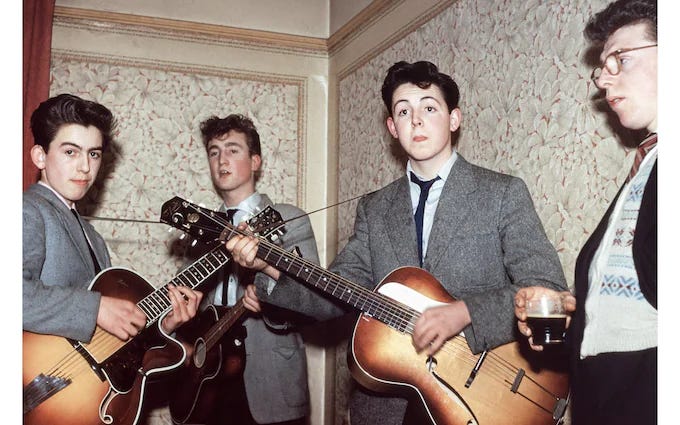


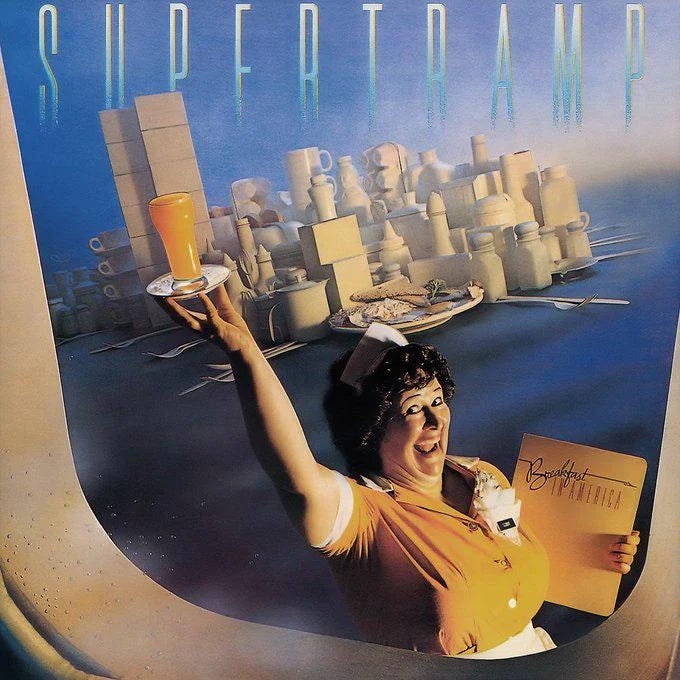

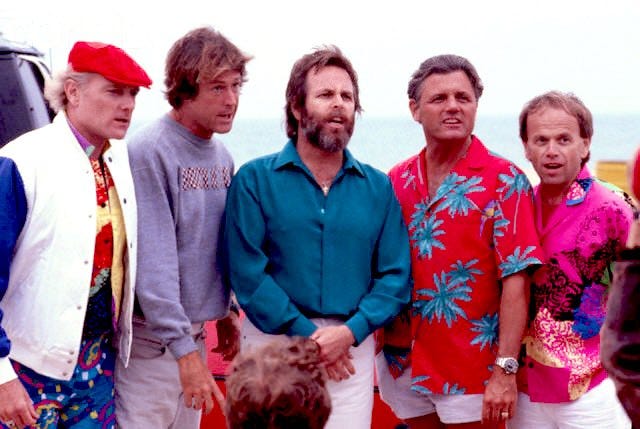
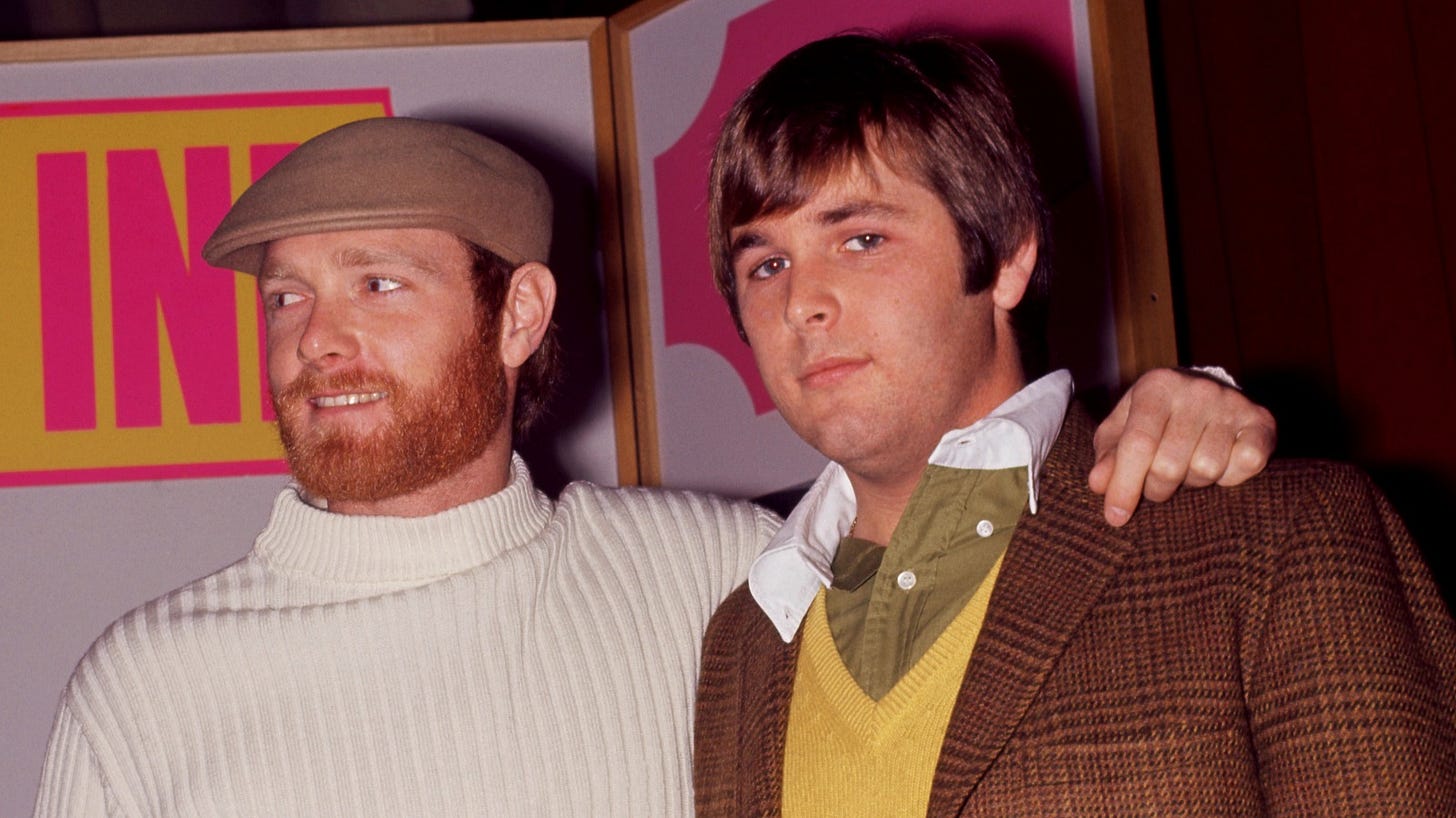

I think it's a truism that your dad heavily influences what kind of music you listen to as an adult. My dad never liked the Beatles (though he did like McCartney's Wings, oddly) so I grew up with lots of Southern Rock, blues, Seventies Rock and proto-metal (one of my first memories as a child is the terrifying opening riff of "Black Sabbath" that made me cry- I love Sabbath to this day) but because my dad was also a not Beach Boys guy, I have never "got them" either.
Once again, an interesting glimpse into a world I'm not terribly familiar with, written in a fun and lively way. That lack of familiarity means I don't have much to add, other than latching on to the aside about Michael Chabon to say that you (and the commentariat) should go read Kavalier and Clay if you haven't already. In general I love how he's clearly a big genre geek, but also approaches it some seriousness and literary finesse. I guess he's kind of like a classier, more skilled China Mieville in that way. Plus, he's given us an example of the very rare middle grade sports fantasy genre in Summerland, which is an important inspiration for an upcoming project of mine. Anyway, I had no idea he was a songwriter too, but I guess it makes sense with how multi-faceted this guy is in his interests.